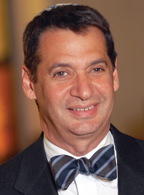 I read with great interest Barbara Bayer’s commentary/response to the community conversation regarding the Pew Research study of which I was a panel participant. My admiration and respect for all of my fellow participants was affirmed during the evening. I was and am appreciative for the opportunity to share my views and the work of my Congregation Kol Ami with the community. However, there is one inaccuracy in the article that requires clarification.
I read with great interest Barbara Bayer’s commentary/response to the community conversation regarding the Pew Research study of which I was a panel participant. My admiration and respect for all of my fellow participants was affirmed during the evening. I was and am appreciative for the opportunity to share my views and the work of my Congregation Kol Ami with the community. However, there is one inaccuracy in the article that requires clarification.
I am not a Reform rabbi. It is not that I would in any way have an issue with being one if I were so. I have great respect for the character and work of all of the Reform rabbis in our community. Having spent most of my adult life as a member of Congregation Beth Torah I am grateful for having been a part of such a wonderful Jewish community (Mazel Tov to them for their 25 years of contributing to Jewish life in Kansas City), and particularly to have Rabbi Mark Levin for my rabbi.
However, I did not receive smichah from (was not ordained by) a seminary recognized by the Reform movement. My seminary, the Academy for Jewish Religion in New York takes great pride in being a pluralistic, trans/post/multi-denominational school. I had three Talmud teachers: one Orthodox rabbi, one Conservative rabbi and one Reform rabbi. My colleagues also represented the broad spectrum of the Jewish American community. For davening we had available to us Siddurim from all movements: Reconstructionist, Renewal, Conservative, Orthodox and Reform.
As I explicitly stated during the community conversation, in addition to the many years I spent at Reform Congregation Beth Torah, I grew up at Beth Shalom (Conservative), davened at Orthodox congregation Kesher Israel in Washington, D.C., during my college years, and was the rabbinic intern at Ohev Sholom (Conservative). I liked and valued each of those experiences, and find something to commend in what each of our broad Jewish communities have to offer K’lal Yisrael. I simply do not want to have to choose one over the other, and would rather freely take what I like from each.
Congregation Kol Ami has never officially affiliated with the Reform movement. More to the point, our kehilah made the conscious decision over the last year or so to present ourselves as non-movement specific, an open tent eager for what each unique voice can bring into our community to enrich our collective spiritual lives. Our members represent this broad spectrum of Jewish theology and practice, seeing our community as one that eagerly welcomes those who have elsewhere felt disenfranchised: Jews who are new to the city with little previous connection to anyone in the community, interfaith couples and families, and people from the LGBT community.
This decision was attendant to our decision to buck a decades-long trend in Kansas City’s Jewish community of moving further and further away from the central city. We are now a truly urban synagogue, worshipping at 45th and Walnut, locating our community garden at 43rd and Forest (east of Troost) working with the historic Manheim Park neighborhood, and engaging in issues of social justice and concern to the central city (issues of gun violence, racial and economic justice, comprehensive immigration reform). By actually locating in the central city these problems truly become “our problems” and not “their problems.”
I would respectfully suggest that categorizing me and my congregation as Reform is not merely a misstatement, but rather reflective of an adherence to preserving a familiar and comfortable way of looking at Judaism in the United States versus seeking real change, and finding new ways to look at forming strong Jewish communities. (The panel organizers also insisted that I was on the panel representing the Reform movement, notwithstanding my insistence that it was not the case.)
Bayer rightfully asserts that “... we have to make adjustments in the way we do things to maintain a viable Jewish community.” But she questions whether or not we will do more than talk about making those needed changes during the next 20 years, stating that “only time will tell.”
We at Congregation Kol Ami are making those changes now. What remains to be seen is whether our Jewish community leaders will support those changes designed to create and strengthen Jewish community, rather than only discuss the need for change, yet commit total support solely to programs and institutions that maintain the status quo.
In regard to disputing my assertion that strong Jewish communities will be built through relationship, and not programming, I would suggest for reading, Dr. Ron Wolfson’s book “Relational Judaism,” Rabbi Elie Kaunfer’s book “Empowered Judaism” and the S3K Report-Synagogue 3000 study, “Reform and Conservative Congregations: Different Strengths, Different Challenges,” which I mentioned during the community conversation.


